Mission to the Mesozoic: The Shores of Kansas by Robert Chilson
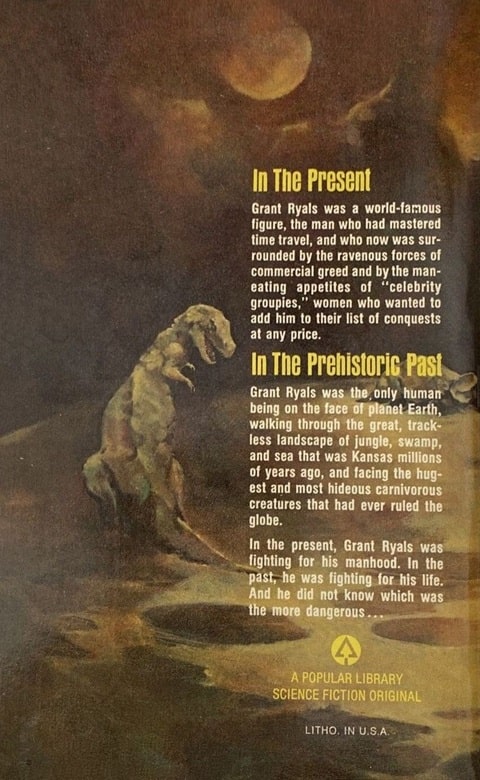 |
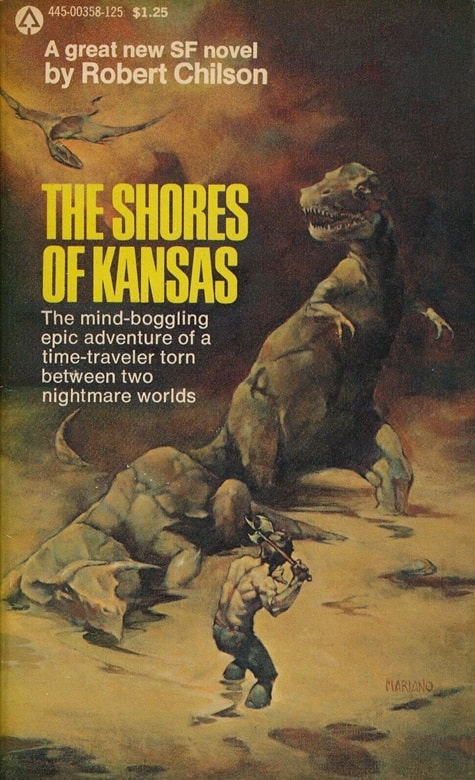 |
The Shores of Kansas (Popular Library, March 1976). Cover by Mariano
Here’s another in my series of reviews of fairly obscure books from the ’70s and ’80s. Like some others, this review is of a book I bought at the Windy City Pulp and Paper Convention in Lombard, IL, earlier this year.
Rob Chilson is a Kansas City based writer (though born in Oklahoma) whose first story appeared in Analog in 1968. (Likely he is one of the few John W. Campbell discoveries still alive, though I think Donald Kingsbury, who is 94 and whose first story was in Astounding in 1952, remains the senior among that group.) His first stories and novels, including this one, were published as by Robert Chilson, though by the mid-80s he was using Rob.
I’ve known Rob for a number of years, seeing him most often at the KC convention ConQuesT. I saw him most recently at the World Fantasy Convention, which was in Kansas City this year, where he was kind enough to sign this very book for me. He’s a fine writer, and I’ve enjoyed his short fiction for a long time, with notable stories including “This Side of Independence,” “Farmers in the Sky,” “The Conquest of the Air,” and a series of stories set 60,000,000 years in the future, called collectively “Prime Mondeign.” (The most recent of these is “The Tarn,” from Analog in 2015.)
I had not read any of his novels until I recently tried his first, As the Curtain Falls, also set in the very distant future. It had interesting aspects, but ultimately I felt it didn’t quite work, and it was clearly a first novel that probably could have used another revision. I’m happy to report that The Shores of Kansas, his third novel, from 1976, is much better.
[Click the images for dino-sized versions.]
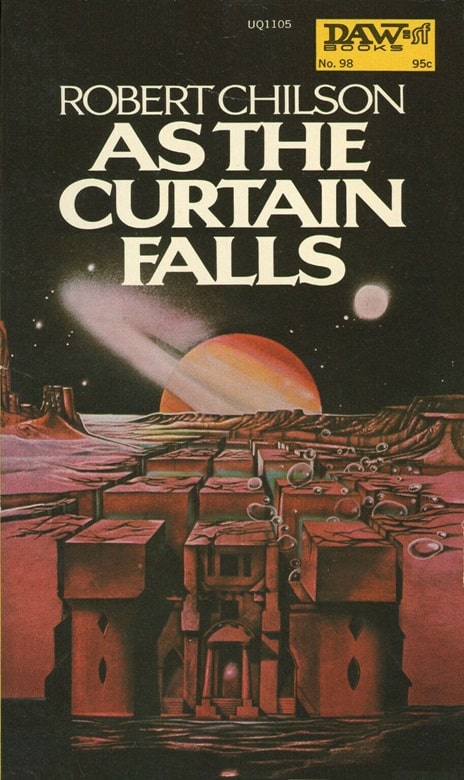 |
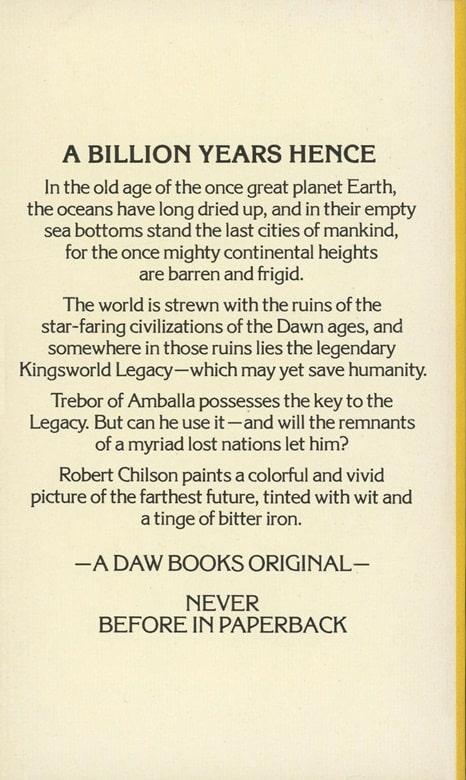 |
As the Curtain Falls (DAW Books, April 1974). Cover by Hans Ulrich Osterwalder and Ute Osterwalder
The protagonist is Grant Ryals, who is one of a number of people who can travel back in time, and return. He has the unique (or nearly unique) talent of going back to a time before there were humans — in fact, back to the Mesozoic Era. He used this talent to film a documentary involving lots of dinosaur action, The Shores of Kansas (referring to the Western Interior Sea, which divided North America into two continents for much of the Cretaceous.) He had started the Chronographic Institute to support his study of the past, and using the proceeds of the documentary, he was able to lavishly fund it. As the novel starts, he is returning from his latest jaunt.
We quickly realize that all is not well at the Institute. A new director, Dr. Adrian, is making a variety of changes, most to Grant’s distaste. Adrian has greatly increased the administrative staff, established what Grant considers unnecessary marks of hierarchy, such as reserved parking spots, hired a number of suspiciously attractive young women while trying to push out some of Grant’s reliable associates, and started to push for the Institute’s publications to take a more popular tone.
Grant is particularly concerned by the de-emphasis on science. Dr. Adrian also starts putting pressure on Grant to make another hit movie — which will help the Institute’s finances, while causing Grant to put less focus on exploring advances in paleontological knowledge versus filming more spectacular dinosaur scenes.
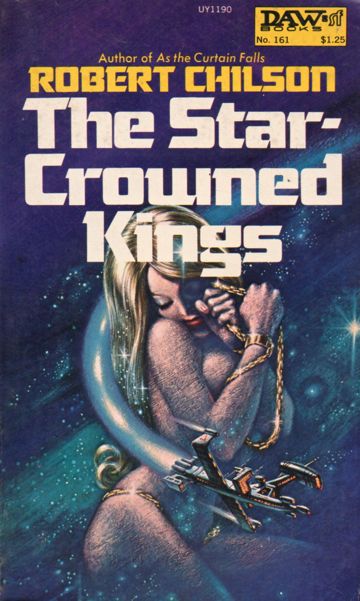 |
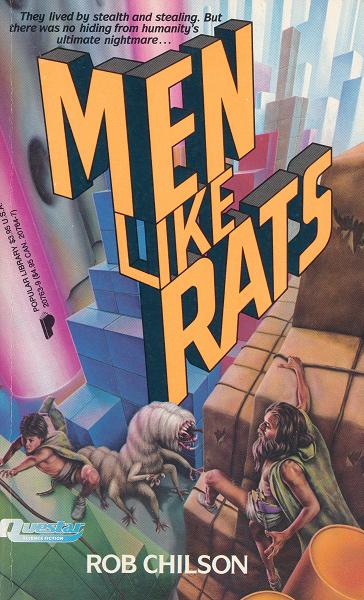 |
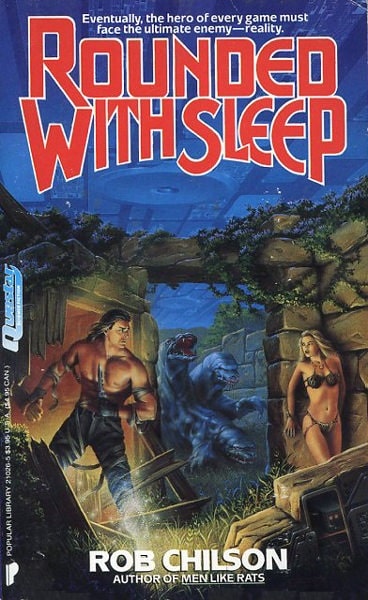 |
Some of Robert Chilson’s other novels: The Star-Crowned Kings (DAW, August 1975),
Men Like Rats (Questar/Popular Library, March 1989), and Rounded with Sleep
(Questar, August 1990). Covers by Kelly Freas, Barclay Shaw, and Tim Jacobus
There’s a personal side to a lot of this as well. Grant resents the new candidate for a Mesozoic time traveler — Marian Gilmore, the only other person to show potential to go back so far in time. But he’s bothered by her — perhaps partly because she reminds him of a woman who rejected him before he got famous? And all in all, Grant’s relationships with women are problematic — he’s become famous enough that all sorts of women throw themselves at him, but he has a hard time trusting them.
The novel fairly deftly manages a balance. There are exciting scenes in the Jurassic and Cretaceous, with Grant observing dinosaurs, chasing them at times, fleeing them at times, learning some new things. Some of this is pretty cool, most of it seems very faithful to paleontological knowledge as of the mid-70s, some is a tad implausible but in a fun way.
And there are extended scenes of Grant in the present day — illustrating his relationship with his laconic father and with his siblings; showing him fighting bureaucratic battles at the Institute; showing him on display for publicity reasons — a meeting with the President, parties with wealthy people, and lots of encounters with women (and one man) who want to sleep with him.
 |
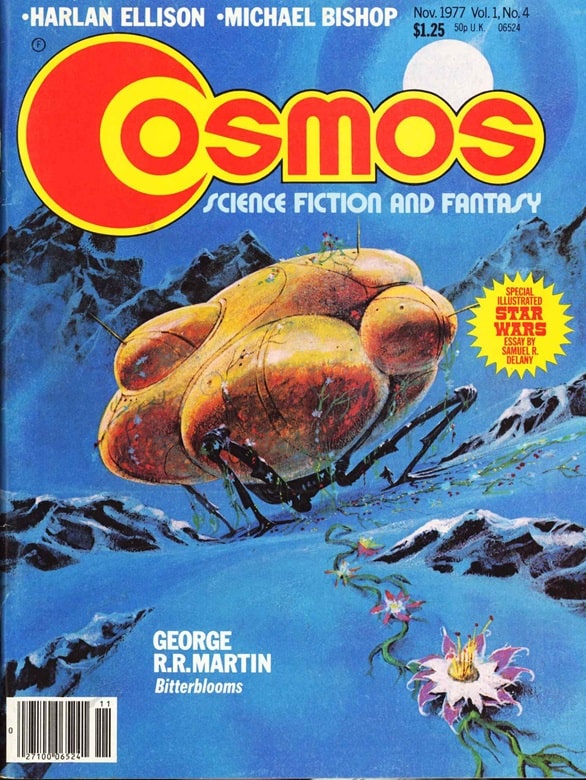 |
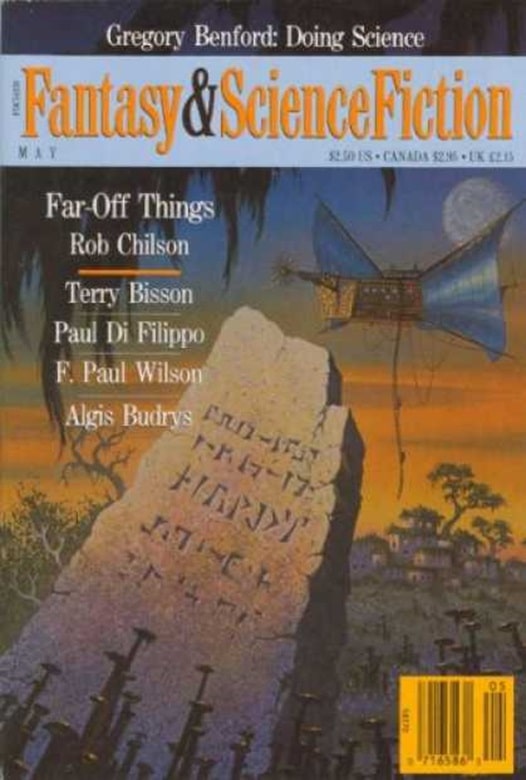 |
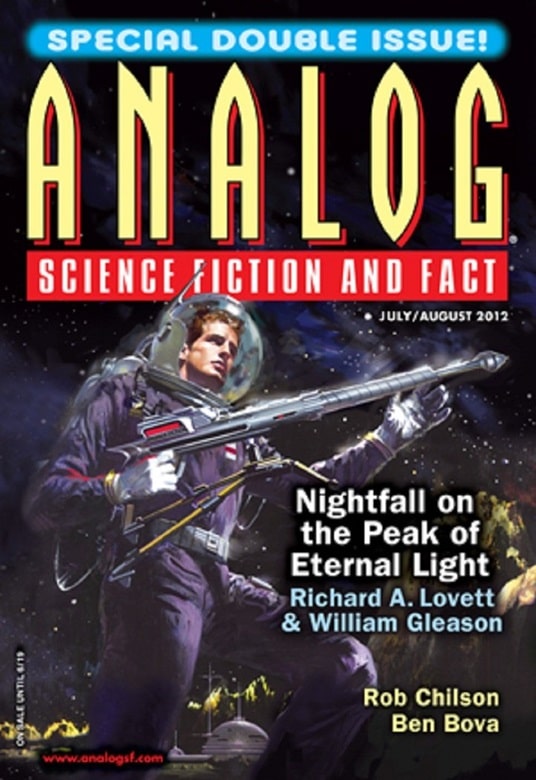 |
Some of Rob Chilson’s magazine appearances: Analog, December 1970; Cosmos, November 1977;
The Magazine of Fantasy & Science Fiction, May 1992; Analog, July/August 2012.
Covers by Kelly Freas, Jack Gaughan, David Hardy, and Vincent Di Fate
He does sleep with a lot of women (including a couple of threesomes and at least one foursome.) I did feel that the sexual politics here were unconvincing, perhaps one might say rather too much “of their time.” Most of the women seemed just too close to cynical fantasy objects. Beyond that, though, I thought Grant Ryals himself a plausible and interesting character, and his struggles believable.
The resolution is a little abrupt — his solutions to his issues with Dr. Adrian, with a scheming woman who seems to be angling for control of the Institute, and with Marian Gilmore are perhaps too easy. (In particular, I think Marian Gilmore deserved more time, and more development.)
But I was never bored, and I was invested. The dinosaur era passages were legitimately exciting, and also depicted what one might call “bush life” quite well. And the prose, which was shaky at times in As the Curtain Falls, is restrained and effective. This isn’t an ignored masterwork, but it’s an enjoyable novel that’s worth the time.
Rich Horton’s last article for us was an obituary for Michael Bishop. His website is Strange at Ecbatan. Rich has written over 200 articles for Black Gate, see them all here.
Not gonna lie — if I’d seen that cover (of Shores of Kansas) on the spinner rack at the library, it probably would have come home with me.
I can’t resist a decent dinosaur cover either.